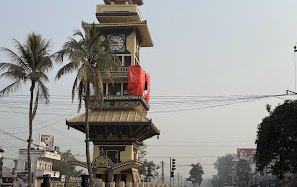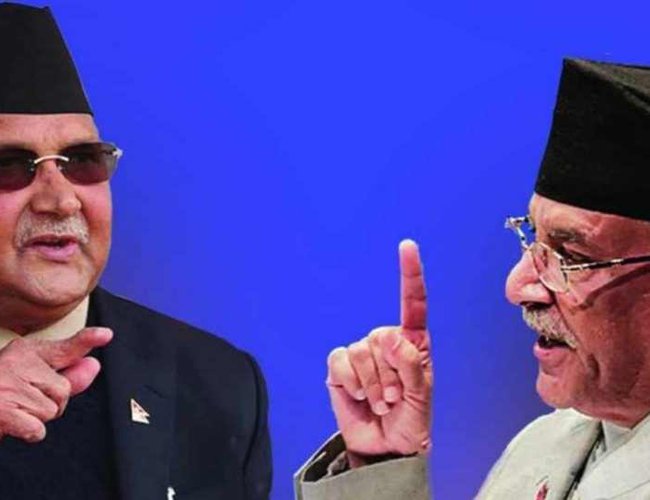
In a recent statement, opposition leader Prachanda characterized Prime Minister Oli as attempting to portray himself as both a witch and a shaman, indicating the precarious direction of Nepal's politics. He cautioned that if Prime Minister Oli and his coalition allies persist in their current behavior, a political uprising akin to that in Bangladesh could ensue. Prachanda noted that the situation is rapidly deteriorating, leaving the possibility of unforeseen developments. He further claimed that his government was removed from power after he revealed the identities of those involved in the Bhutanese refugee scandal, the cooperative scandal, and other corruption-related issues.
Displeased with Prime Minister Oli's political maneuver to remove him from authority, Maoist leader Prachanda is still grappling with the aftermath of this unexpected development. In a bid for political retribution, Prachanda is aligning himself with all factions that have opposed PM Oli.
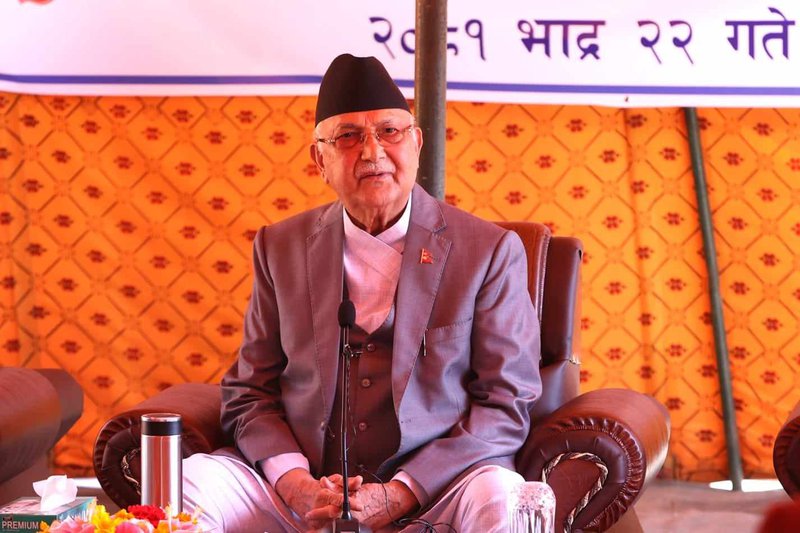
As the adage in politics suggests, "your adversary's energy can be your ally," Prachanda is discreetly engaging with those who oppose CPN-UML leader Oli. During his statements in the House of Representatives, Maoist leader Prachanda alluded to the potential for a widespread uprising against the Oli administration, reminiscent of the situations in Bangladesh and Sri Lanka.
Conversely, Prime Minister Oli and the CPN-UML are focusing their efforts on targeting Maoist chairman Prachanda and his party. Prime Minister Oli asserted that a political upheaval akin to that in Bangladesh is improbable until he and his party regain power.
The Ruling Alliance Criticizes Prachanda
As the principal opposition figure, Prachanda has embarked on a nationwide campaign to rally party members in preparation for various political scenarios. In response, the ruling coalition has determined to present a united front to enhance the effectiveness of both the government and the parliament.
During a recent meeting, Prime Minister KP Sharma Oli expressed his discontent with the actions of Maoist Chairman Prachanda. A participant noted that following the passage of the Truth and Reconciliation bill, there was a need to reach a consensus on establishing the commission; however, Prachanda appears to be engaging in provocative political maneuvers instead. The Chief Whip of CPN-UML remarked that misleading narratives are being propagated, particularly stemming from statements made by Pushpa Kamal Dahal, the leader of the opposition Maoist Center.
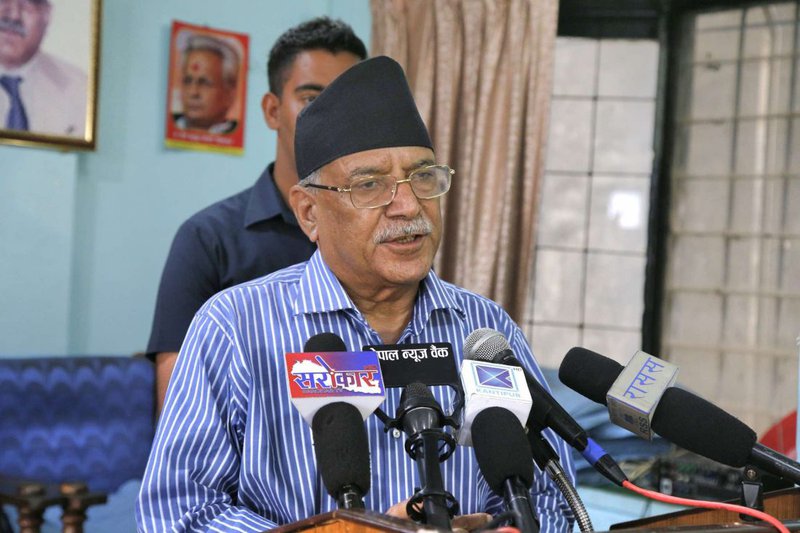
"We initiated discussions after hearing unfounded claims that Nepal would become like Bangladesh, along with false assertions regarding constitutional amendments," he stated. The ruling parties convened on Monday evening at Baluwatar, the Prime Minister's official residence, and resolved to maintain solidarity in support of the government.
"Politicians can wish for upheavals to get benefits and reach in power. But it is impossible in Nepal because of the inclusive and democratic constitutional work," Prime Minister Oli said.
He accused Prachanda of making irresponsible remarks and conspiring to topple the government by creating political upheaval and uncertainty.
"One can dream as he wishes. New political turmoil is not possible in Nepal. Such turmoil will only benefit the regressive forces. We have overthrown the monarchy and promulgated a new inclusive, secular, federal and republican constitution," said Oli, who is also at loggerheads with Kathmandu Metropolitan City Mayor Balen Shah.
Shyam Ghimire, the chief whip of the Nepali Congress, stated following the meeting that it has been determined that the parties will remain united in support of the government. He indicated that the groundwork for developing a minimum common program to ensure solidarity among the power partner parties has commenced.
Ghimire noted that there were already seven points established between the UML and the Nepali Congress, and a minimum common program will be formulated based on these points to foster unity among all parties involved. He expressed confidence that this program would be ready within a few days. A working group tasked with drafting the minimum common program was established during the meeting of Congress and UML leaders on Sunday evening.
This committee includes Congress General Minister Gagan Thapa, Spokesperson Prakasharan Mahat, UML Deputy General Secretary Pradeep Kumar Gyawali, and Vishnu Rimal. Chief Whip Ghimire also mentioned that the perspectives of other power partner parties will be incorporated into the draft prepared by the working group. However, he emphasized that since the Congress and UML are the principal parties, the drafting committee comprises leaders from these two organizations.
Following the establishment of the working group, a meeting was convened today with the leaders of the ruling parties, including JSP, LOSPA, Janmat Party, and NAUPA. The discussion, which lasted nearly three hours in Baluwatar, concluded with UML's chief whip Mahesh Bertaula echoing sentiments similar to those expressed by Congress's Ghimire. Chief Whip Bertaula remarked, "We have initiated discussions regarding the collaboration of ruling parties to enhance the effectiveness of both the government and parliament." The leaders reached a consensus to present a united front in support of the government, and the topic of constitutional amendment was also addressed during the meeting. There exists some uncertainty surrounding the amendment process. Chief Whip
Bertaula stated, "We have deliberated on strategies to dispel such misconceptions." Additionally, Prime Minister Oli voiced his discontent regarding the actions of Maoist Chairman Prachanda. According to a participant, following the passage of the truth-telling bill, there was a need to secure agreement for the establishment of the commission; however, Prachanda is perceived to be engaging in politics of provocation instead.
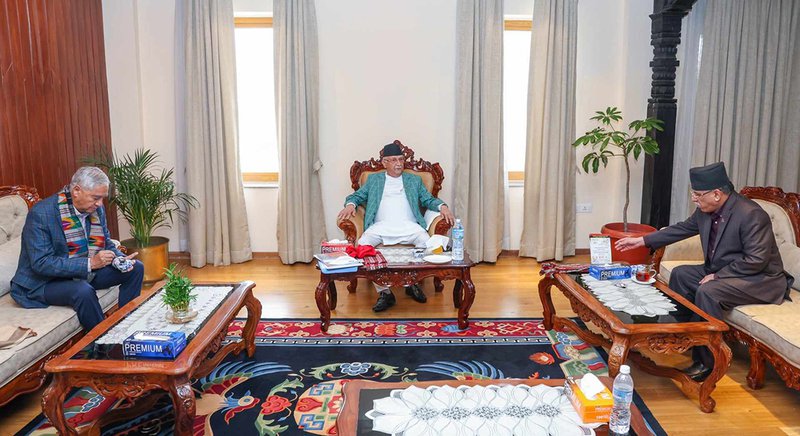
Hostile Situation
The increasing discontent and anger among the youth suggest that the potential for new unrest remains a possibility if the government implements any unpopular policies. The recent move by the government, led by KP Sharma Oli, to dismiss Kul Man Ghising from his position as Managing Director of the Nepal Electricity Authority (NEA) and to subject him to scrutiny by the Public Accounts Committee of the House of Representatives has proven to be counterproductive. During a recent public gathering held in celebration of Gaura Parba, young people voiced their dissent by chanting slogans against Prime Minister Oli and his administration, urging their peers to rise against the corrupt practices of the government and its leaders. Despite the presence of Prime Minister Oli and former Prime Minister Sher Bahadur Deuba, the youth expressed their disapproval vocally. In contrast, they received anti-Oli leader Bhim Rawal with enthusiasm as he spoke at the event. Although the Public Accounts Committee, chaired by a leader from the CPN-UML, passed a resolution calling for action against MD Ghising, the ruling coalition, led by Nepali Congress leader Arjun Narshing KC, and others opposed this initiative.
The current support emanating from social media indicates that any action taken against the well-known figure Ghising at this time could incite a protest. Various groups, including the Maoist center and other fringe organizations, are poised to exploit this situation.
Prachanda's Challenges
Chairman of the CPN (Maoist Center), Prachanda, has called upon the government to make a decision via the Council of Ministers regarding the recovery of approximately Rs 22 billion in arrears owed by businessmen.
Following criticism from CPN-UML leaders allied with Oli during a session of the Public Accounts Committee, Prachanda attributed issues of corruption and poor governance to CPN-UML leader Oli. In his address to the House of Representatives, he emphasized that such decisions should be made by the Cabinet rather than relying on suggestions disseminated through social media platforms like Facebook.
The Prime Minister also asked on Face Book why twenty one billion eighty eight million tax was not collected for nine years. The Prime Minister who has the right intentions should ask this question from the Cabinet. This question is not specifically asked, the person who should answer is Prime Minister Oli himself," Dahal said. "Who created this controversy by not allowing the authority to do its work on its own?"
On the 31st of Baisakh, 2075, the investigation committee established by the authorities regarding trunk lines and dedicated lines presented a report indicating that 61 industrial entities were utilizing electricity from the dedicated trunk line without remitting the appropriate tariffs.
Subsequently, measures were taken to cut the electricity supply. It was noted that while some industries had their lines disconnected to recover outstanding payments, the directive to reconnect these lines originated from Prime Minister Oli. Furthermore, a committee comprising three ministers and secretaries was formed, with the mandate to authorize the immediate reconnection of lines and to halt any further disconnections until further notice, a decision also made by Prime Minister KP Oli.
Additionally, the Council of Ministers, under the guidance of Prime Minister KP Oli, will determine the implementation of the committee's recommendation to raise fees solely for the interim period. Lastly, inquiries regarding the reduced payments from Facebook will also be addressed by KP Oli.
The leader of the primary opposition party, CPN Maoist Center, Prachanda, has called upon the ruling parties to not only maintain the chairmanship of the Public Accounts Committee but also to ensure that the leader of the main opposition party retains this position if necessary. In parliamentary practice worldwide, the chair of the Public Accounts Committee is traditionally held by the opposition, serving as a mechanism for democratic balance and oversight.
Prachanda asserted that the government, under Prime Minister Oli, is undermining itself by disseminating false allegations via social media. He emphasized that the opposition should rightfully receive the chairmanship of the Public Accounts Committee in the current parliament; however, there are widespread concerns that this will not occur. This apprehension arises from the belief that the ruling coalition is so entrenched in its own interests that even a two-thirds majority is insufficient without the inclusion of this committee. The current dynamics observed within the Public Accounts Committee further support this assertion.
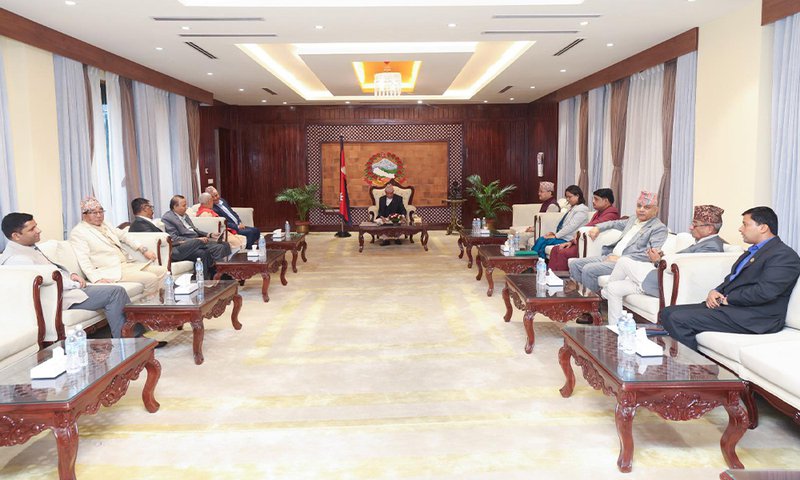
However, esteemed members of Congress-UML, it is imperative to understand that you cannot silence our advocacy for the people's voice by diminishing our role. My challenge is not limited to the Public Accounts Committee; if necessary, the position of the leader of the principal opposition party should also remain with you. Yesterday, we stood against your misgovernance as responsible citizens, and today we continue to embody that courage and resolve.
As the rivalry intensifies among the ruling coalitions led by KP Sharma Oli, the principal opposition leader, Prachanda, is seeking to broaden his alliances with both parliamentary and non-parliamentary parties. Should the relationships among the major political entities continue to deteriorate, Nepal may encounter significant political repercussions in the near future.
Oli's unpredictable disposition remains a concern. While the Nepali Congress supports Prime Minister Oli with the expectation that he will honor his commitments, his unpredictable nature leads NC leaders to maintain open lines of communication with Maoist leader Prachanda.
Oli is widely regarded as a person prone to vindictiveness. Despite Kul Man Ghising holding only a joint secretary position within the Nepal Electricity Authority (NEA), Prime Minister Oli, as the executive leader of Nepal, has been orchestrating various forms of retribution against him.
Recently, PM Oli also dismissed Shanker Das Bairagi, a seasoned diplomat and former Chief Secretary, from his role as National Security Advisor.
Furthermore, he abolished the position altogether, along with the cabinet guidelines that had been established to create it. Although Bairagi is a highly skilled and capable individual with decades of experience in diplomatic service, PM Oli harbors a dislike for him due to Bairagi's previous service under Prachanda's administration. This unpredictable behavior has led to a lack of trust from political leaders in neighboring countries. In light of the current situation, any minor misstep by the political leadership could potentially trigger significant political unrest, with Maoist leader Prachanda poised to seize the opportunity.

Keshab Poudel
Poudel is the editor of New Spotlight Magazine.
- ERC Nepal Is Focused On Expanding Distribution And Transmission To The Private Sector: ERC Chair Dr. Dhital
- Jul 06, 2025
- FOURTH PROFESSOR Y.N. KHANAL LECTURE: Nepal-China Relations
- Jun 23, 2025
- Colonel JP CROSS: Centenary Birthday
- Jun 23, 2025
- BEEN: Retrofitted For Green
- May 28, 2025
- GGGI has been promoting green growth in Nepal for a decade: Dr. Malle Fofana
- May 21, 2025








